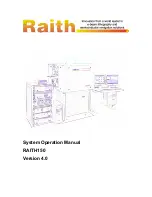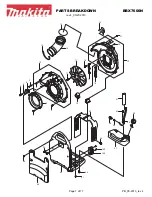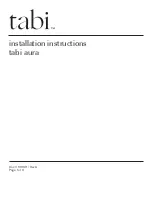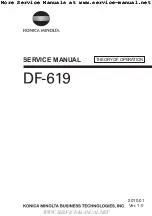
©
American DJ
®
- www.americandj.com - Starball LED DMX™ Instruction Manual Page 8
©
American DJ
®
- www.americandj.com - Starball LED DMX™ Instruction Manual Page 7
Operating Modes:
Stand-Alone Operation (Sound Active and Auto Program):
Sound Active:
1. Put dipswitch #1 in the ‘On” position. The unit will react to the low
frequencies of music via the microphone.
Auto Program:
1. To run the Auto Program, put dipswitches 1 & 2 in the “On” po-
sition.
Dipswitch 3 will reverse the rotation.
Dipswitches 4, 5, & 6 will control the speed of rotation.
2. The optional
UC3 Controller
(not included)
may be used to con-
trol different functions including blackout. See the next page for
UC3 controls..
Master-Slave Operation:
This function will allows you to link units together to run in a Master-
Slave mode. In Master-Slave operation one unit will act as the con-
trolling unit and the others will react to the controlling units built-in
programs. Any unit can act as a Master or as a Slave however, only
one unit can be programmed to act as the “Master.”
1. Using standard XLR microphone cables, daisy chain your units
together via the XLR connector on the rear of the units. Remem-
ber the Male XLR connector is the input and the Female XLR
connector is the output. For longer cable runs we suggest a
terminator at the last fixture.
2. Simply daisy chain the units together using XLR cables.
3. For the Master unit put dipswitch 1 in the “On” position, and all
other dipswitches in the “Off” position. For the Slave units, put
any dipswitch in the “On” position, except, the #1 dipswitch.
The #1 dispswitch must stay in the “Off” position on all Slave
units.
3. The optional
UC3 Controller
(not included)
may be used to con-
trol different functions including blackout. See the next page for
UC3 controls.
Universal DMX Control:
This function allows you to use a uni-
versal DMX-512 controller such as the Elation
®
DMX Operator™ or
Show Designer.™ to control the DMX traits. Operating through a DMX
Starball LED DMX™
Operation
Starball LED DMX™
Set Up
Special Note: Line Termination.
When longer runs of cable are
used, you may need to use a terminator on the last unit to avoid erratic
behavior. A terminator is a 90-120 ohm 1/4 watt resistor which is con-
nected between pins 2 and 3 of a male XLR connector (DATA + and
DATA -). This unit is inserted in the female XLR connector of the last
unit in your daisy chain to terminate the line. Using a cable terminator
(ADJ part number ZDMX/T) will decrease the possibilities of erratic
behavior.
DMX512 IN
3-PIN XLR
SOUND
REMOTE
CONTROL
INPUT
POWER
INPUT OUTPUT
SOUND
REMOTE
CONTROL
INPUT
POWER
INPUT OUTPUT
SOUND
REMOTE
CONTROL
INPUT
POWER
INPUT OUTPUT
DMX512
DMX+,DMX-,COMMON
1
2
3
Termination reduces signal errors and
avoids signal transmission problems
and interference. It is always advisable
to connect a DMX terminal, (Resistance
120 Ohm 1/4 W) between PIN 2 (DMX-)
and PIN 3 (DMX +) of the last fixture.
1
2
3
1
2
3
DMX +
DMX -
COMMON
DMX512 OUT
3-PIN XLR
Figure 4
5-Pin XLR DMX Connectors.
Some manufactures use 5-pin XLR
connectors for DATA transmission in place of 3-pin. 5-pin XLR fixtures
may be implemented in a 3-pin XLR DMX line. When inserting stan-
dard 5-pin XLR connectors in to a 3-pin line a cable adaptor must be
used, these adaptors are readily available at most electric stores. The
chart below details a proper cable conversion.
Conductor
5-Pin XLR Male (In)
3-Pin XLR Female (Out)
Pin 1
Do Not Use
Do Not Use
Pin 3
Pin 2
Pin 1
Pin 3
Pin 2
Not Used
Not Used
Data True (+ signal)
Data Compliment (- signal)
Ground/Shield
3-Pin XLR to 5-Pin XLR Conversion
Figure 3
1 Ground
1 Ground
XLR Male Socket
XLR Pin Configuration
3 Hot
2 Cold
2 Cold
3 Hot
XLR Female Socket
Pin 3 = Data True (positive)
Pin 2 = Data Compliment (negative)
Pin 1 = Ground
























